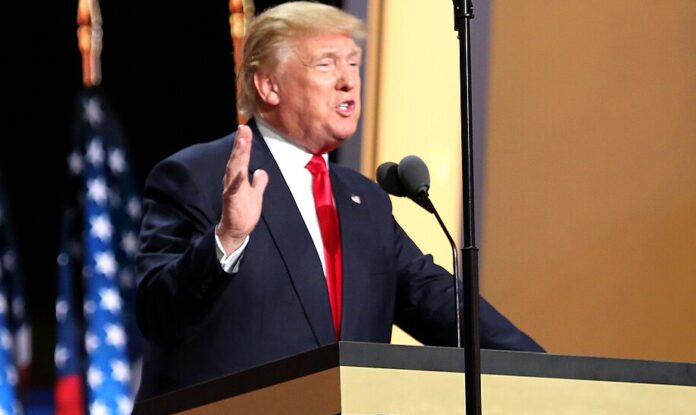A dozen US states challenge Trump’s tariffs, arguing they lack congressional approval
In the Trump tariffs lawsuit challenge, a dozen US states have filed a lawsuit against President Donald Trump’s controversial tariffs, arguing that he overstepped his constitutional authority by imposing levies without Congress’s approval. Led by New York Governor Kathy Hochul and Attorney General Letitia James, the lawsuit was filed with the United States Court of International Trade, accusing the president of unlawfully invoking emergency powers to impose tariffs on foreign goods.
The legal action focuses on Trump’s use of the International Emergency Economic Powers Act (IEEPA), a law originally designed to address national security threats, to justify imposing tariffs. The states contend that the president’s invocation of the IEEPA is unconstitutional, as the law was never intended to grant a president the power to impose tariffs. The lawsuit asserts that tariffs must be authorised by Congress, and that the president’s actions have disrupted the US economy and global trade.
In response, the White House lashed out at New York Attorney General James, accusing her of prioritising a political “witch hunt” against Trump rather than focusing on the needs of her constituents. White House spokesman Kush Desai defended Trump’s actions, arguing that the tariffs were necessary to address the “national emergencies” of illegal immigration and the rising US trade deficit, particularly with China.
The lawsuit argues that by using the IEEPA to unilaterally impose tariffs, Trump has undermined the constitutional order. The states claim that the tariffs have created chaos in the American economy, disrupting trade relationships and causing widespread uncertainty. The lawsuit also notes that no president has previously used the IEEPA to impose tariffs, pointing to the law’s intended purpose of addressing security threats, not trade imbalances.
Trump’s administration has long justified tariffs as a way to reduce the trade deficit, especially in countries like China, Canada, and Mexico. In April, during an event dubbed “Liberation Day,” Trump introduced reciprocal tariffs targeting several nations. This move was widely criticised for its potential impact on global markets, and following a backlash, the president announced a temporary pause on the tariffs and reduced the rate to 10% for most countries. However, the pause did not apply to China, with the US imposing a staggering 145% tariff on Chinese goods.
The tensions between the US and China over trade have led to a full-blown economic standoff, rattling markets globally. Trump’s critics argue that the tariffs could escalate into a trade war with significant long-term consequences for both the US and its trading partners. On Wednesday, Trump indicated that he hoped to reach a deal with China soon, but reiterated that the 145% tariff was “very high” and necessary to address what he perceived as China’s “lack of respect” in trade negotiations.
In addition to China, Trump’s tariffs have affected trade with Mexico and Canada. The administration imposed 25% tariffs on certain goods from the US’s neighbours, further complicating trade relations. These tariffs have sparked concerns among businesses that rely on cross-border supply chains, as well as global markets that are already facing volatility due to the pandemic.
The lawsuit filed by the 12 states is the latest in a series of legal challenges to Trump’s use of executive power to impose tariffs. Last week, California filed its own lawsuit arguing that Trump lacked the legal authority to use the IEEPA in this way. Other legal challenges are expected to follow as the broader question of presidential authority over trade policy remains unresolved.
The case could have significant implications for future US trade policy and presidential powers. If successful, the lawsuit could force a re-examination of the way tariffs are imposed in the US and set new precedents for how future presidents can use emergency powers in trade negotiations. As the legal battle unfolds, the stakes remain high, not only for Trump’s administration but for the future of US trade relations.
